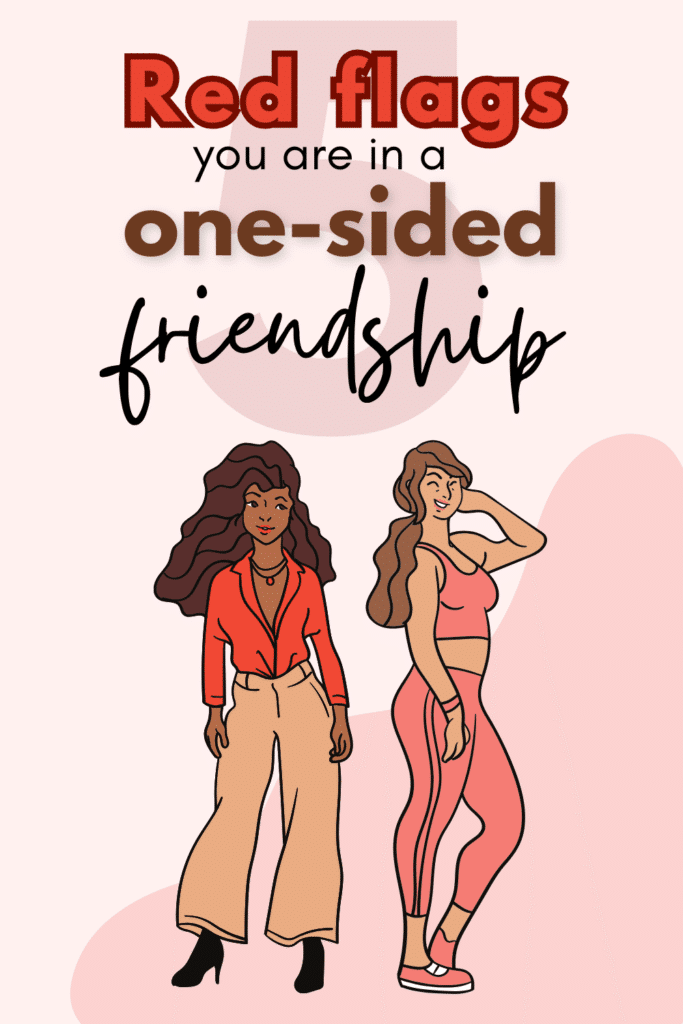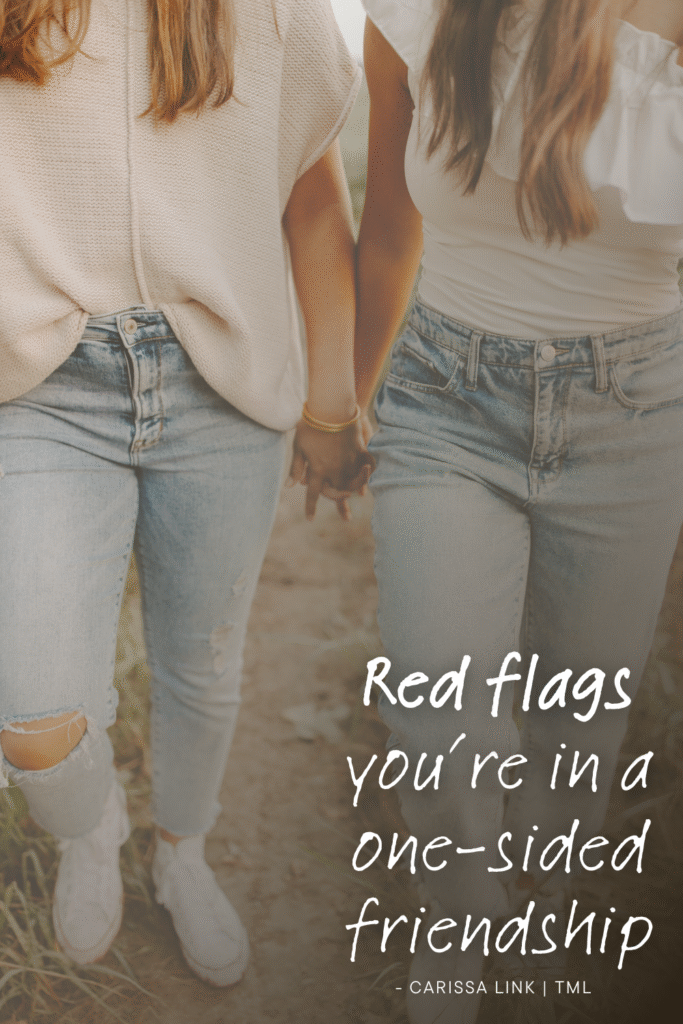Is true friendship based on a constant, equal effort, or are one-sided fluctuations normal?
If you’re in a heavily one-sided friendship, the red flags will be big, loud and in your face. But I want to preface by saying that friendships, among all relationship types, will teeter-totter in level of effort and individual capacity. Meaning, how much you’re willing and capable of bringing to the table may not [always] be the same as another.
This doesn’t necessarily doom a meaningful connection, or it shouldn’t (at least).
I only realized what a *true* one-sided friendship was well into my adult years. Oftentimes we’re quick to write off a friend as being one-sided simply because we’re basing the friendship off a constant, strict 1:1 ratio, when that isn’t realistic.
Friendships, and the individuals within them, go through all the motions of life, which means the entity of friendship may and will likely change through those motions. For example, your friend had a baby, and you notice you’re doing more of the initiating. All the while that friend is doing their best to make an effort to show up in the friendship – the simple fact is showing up may look a little different than before.
As individuals, we have to be willing to ask ourselves how open and accepting we are of fluctuations and change that isn’t necessarily detrimental to friendship but that may not always align with our expectations to the T. To me, that’s completely different from the red flags of a one-sided friendship.
Here are 5 signs your friendship is one-sided.
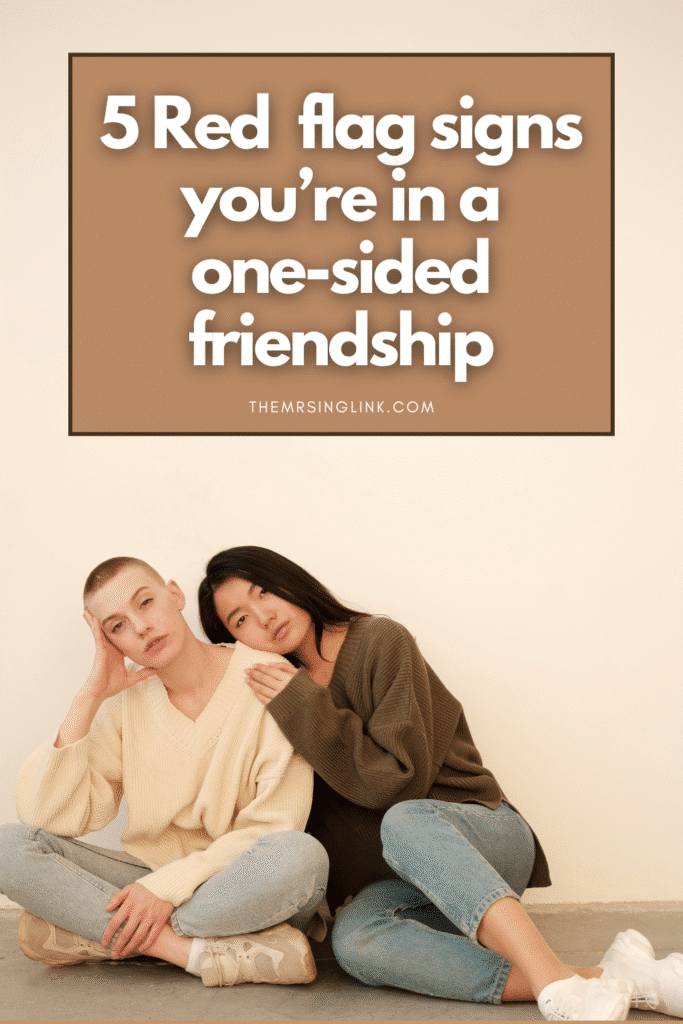
As always, the thoughts, insights, beliefs and opinions expressed throughout this post are my own. If you have any personal or specific questions, feel free to reach out to me!
If you’re not the one reaching out, you won’t hear from them
Let me reiterate that a fixed, objective 1:1 is not the norm. It’s not realistic, nor is it a realistic expectation. That being said, we have to be willing to loosen or have some level of flexibility when it comes to balance of effort and reciprocity. Otherwise, we’re prone to taking both to such an extreme we end up sabotaging perfectly healthy friendships.
I’ll be the one to admit I’ve made this mistake before that cost me friends and potential ones.
Individually, we all draw the hard line in the sand and set our own extremes – we typically decide for ourselves what is acceptable and what isn’t. For those that say anything remotely outside 1:1 or 2:1 is considered extreme, we must realize that this only sets ourselves up for failure, disappointment and heartbreak.
A chaotic or severe imbalance of effort and reciprocity is what I am drawing attention to in this point. Again, individual capacity varies and changes depending on life circumstances and phases, which is why I want to stress that just because a friend may not reach out as often – as often as before, as you’d like or as you do – doesn’t always equate to the friendship being one-sided.
BUT, if you’ve reached out to a friend 10 proactive times for every 1 time they’ve proactively reached out to you (regardless of whether you received a response), that could obviously qualify as being one-sided. Basically, would you even exist in their world if it weren’t for you having to insert yourself into it?
[Related Read: Friendship Fallout – I’ve stopped fighting for the wrong friends ]
Double standards rule the friendship
We all know what double standards are, right? When these overtake and rule over a friendship, it can leave the connection strained or drained on one side. I know this can be best explained through examples pertaining to friendship, so I will do just that.
Double standards that rule over a friendship may look like:
- That one friend that tends to only reach out when they *need* you or something from you (aka, this is a friend that treats the friendship as a resource), but when you need them, they’re either always 1. MIA, 2. filled with excuses (rather than aiming to help or support the best way they can) or 3. responding with claims that villainize you – that you are too needy, expect too much from them and that what they do is never enough.
- You express to a friend the hurt you feel after they [said something, did something], and they either 1. dismiss it like it was no big deal, no one’s to blame, and accountability is unnecessary, 2. say sorry yet continue the behavior shortly later, or 3. bring up all the things you’ve said and done to them as a means to excuse their behavior and point the finger at you. On the flip side, that friend expects full compliance when they express their feelings to you, or will otherwise punish you through shame, guilt-tripping or silent treatment behavior.
Basically, when they do something it’s OK but not when you do it.
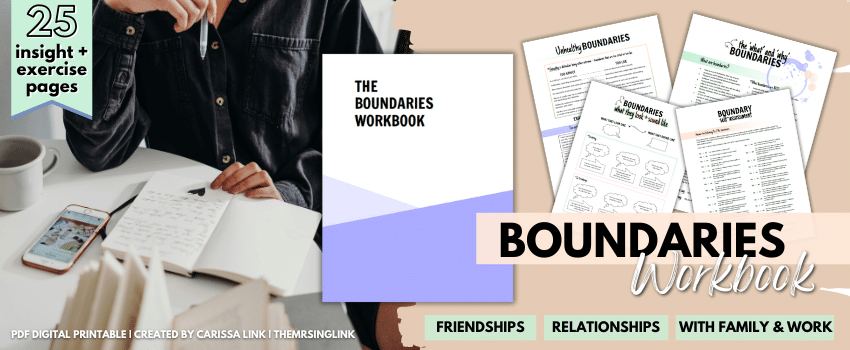
You’re always walking on eggshells
Case in point from above, when you’re in a strained or drained friendship it can feel like you’re constantly walking on eggshells or having to tip-toe around their feelings.
They don’t even have to be doing anything necessarily malicious to you. For instance, your friend is always up to their neck in drama, where you become their primary emotional dumping grounds. This can also create a very unhealthy, one-sided dynamic.
Another example is having that very opinionated and headstrong friend in your life, and because of their more outwardly *vibrant* personality you’re often left feeling invalidated or even inferior in certain situations or conversations. Maybe sharing your thoughts, beliefs or opinions has even led to this friend to react not necessarily hostile towards you but testy and combative, where keeping the peace in the friendship means always having to remain silent, smile, be agreeable and compliant.
[Related Read: 4 Signs they are not your friend – they only want *fans*]
A friendship is evidently one-sided when one friend is left feeling strained (held hostage), depleted and exhausted by the other. This person will be hyper-vigilant of the other’s mood (i.e, feeling responsible if that friend is in a bad mood), frequently questions when and if that friend is mad or upset at them (i.e., having to watch what you they say and do around them) and worries about the other shoe dropping during times the friendship is in a seemingly happy place (i.e., you can’t rest in the peace between you because you’re always scanning for the next wrong turn).
Let’s not get it twisted. As someone guilty of fitting that one-sided description, it’s not considered the healthy side, either.

They’re pitted against you
A very one-sided friendship is evident when polar opposites are forcing to coexist. These polarities don’t necessarily have to be malicious, but they can be. One friend could simply be supportive while the other is not (meaning never or majority, and that unsupport could be imposed on the other in unhealthy ways).
Unfortunately, part of me thinks we’re not only more likely to endure toxic friendships but normalize practicing it. Often out of pride, disdain and jealously, that friend will “make an enemy of you”. Sound familiar? For instance,
- They’re rarely if ever supportive of you, and I’m not talking about involuntary support. They will hardly celebrate in your victories, nor will they be uplifting in times you need it most (like when you’re working hard to lose some weight).
- That one-sided friend really couldn’t care if you lived or died – *that* vibe. The time you got into a major car crash – they seemingly reacted as if it was a shame the car didn’t hit you head on at high speed.
- They secretly and intentionally sabotage you (or set you up for failure), and the worst part is they live for it. It’s their source of entertainment in the friendship to watch you stumble, make a fool of and humiliate yourself (whether at their doing or not).
- That one-sided friend may turn mutual friends against you over time. They may do this in back-door ways, where you are completely unaware of their intention to isolate you from others in the friend group. Sometimes this is as simple as refusing to include you in the friend group or telling white lies about you to others.
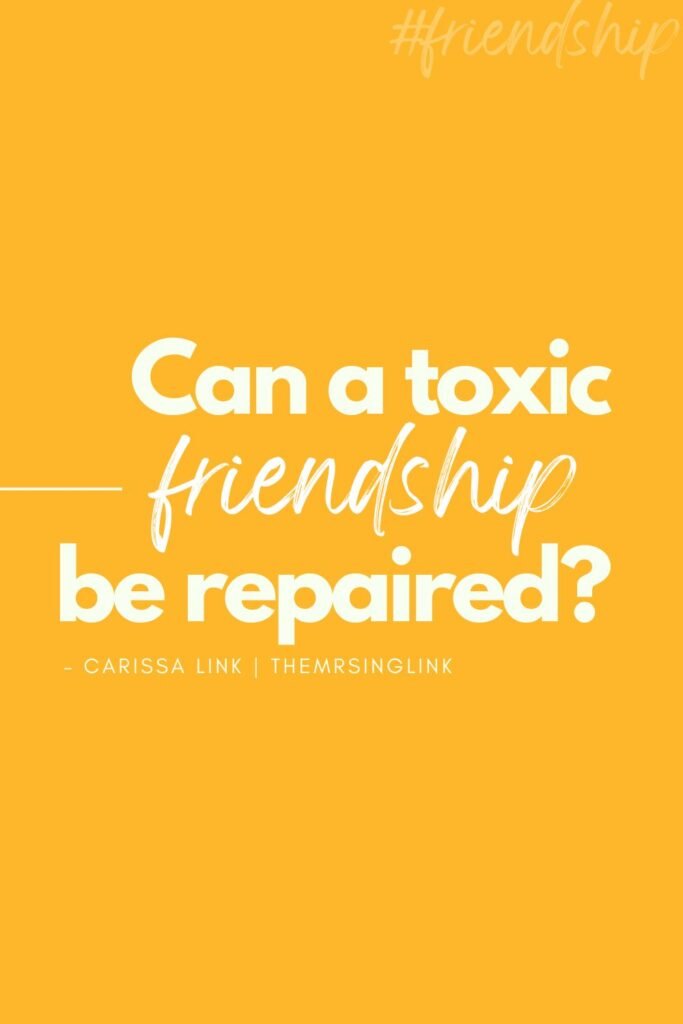
The ball never seems to leave your court
Or it may even feel like the ball is always sitting in their court – you just end up walking over, taking it, and attempting to serve it to them again. In other words, you’re the only one playing while your friend has forfeited the game.
This obviously isn’t a one-time thing, either. What makes a one-sided friendship one-sided is that one side is active when the other is clearly not.
It’s important to remember, though, that even active friendships can still be lifeless. Active friendships can simply go through the motions at bare minimum or with zero sustaining growth or true connection.
Therefore, what can this dead-end game look like between one-sided friendships?
- For years you’ve remembered and acknowledged a friend’s birthday (or other holidays) while this friend has failed to do so for yours year after year.
*IMO, I no longer subscribe to the idea that you’re objectively a bad friend if you forget or fail to acknowledge a birthday, and a good friend if you do. It’s taken me a long time to wrestle with the fact that every single person measures another friend’s goodness and worthiness of being in their life based on the personal things that are important to them. - You are reaching out, initiating and planning to get together the majority of the time while your friend remains indifferent and non-reciprocal.
*Specifically, I used indifferent because that shows a friend could not care less to see you (even if they say “I miss you” or “I want to see you”) and whether you actually got together or not. Getting together is of minimal or zero priority to them, in any way. FYI, this doesn’t necessarily apply to Long Distance Friendships (LDF) as long as both parties are making effort in other, realistic ways. - Your bids to connect are mostly met with passive or active rejection – i.e., the majority of the time your texts/calls go long periods of time unanswered (if at all, they may reach out down the road but without any acknowledgement of your previous text/call) and they *too frequently and unnecessarily* cancel, back out, bail last minute or stand you up on plans to get together (with or without proper notice).
*As an introvert, while I can certainly extend grace in this area on many levels, when this behavior becomes the fabric of your friendship the entire thing will only begin to unravel until there’s nothing holding you together.
If I’ve not been clear enough, not everyone will be a friend the same way you are, and we really shouldn’t [can’t] expect only to find and befriend those exactly like us and operate within friendship identically. A friend can still absolutely Love and care about you, want a friendship to work and not need to get together or be in contact as much or as often as you.
A one-sided friendship is not the same as accepting an imperfect friendship with imperfect people – with awareness and acknowledgment of this – who are trying to make it work the best way they can. A one-sided friendship almost always involves one person who has actively removed or checked themselves out of the friendship altogether…and knows it.
